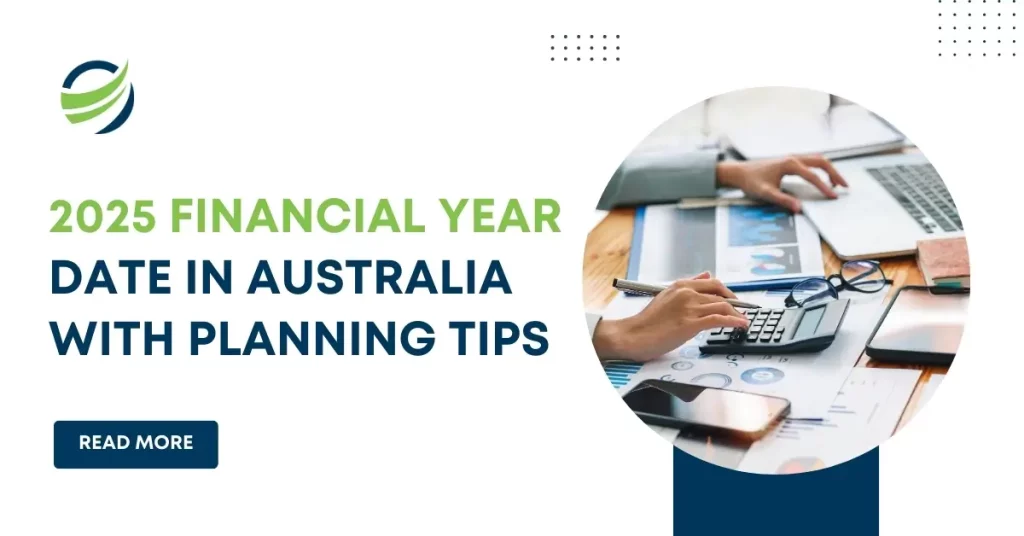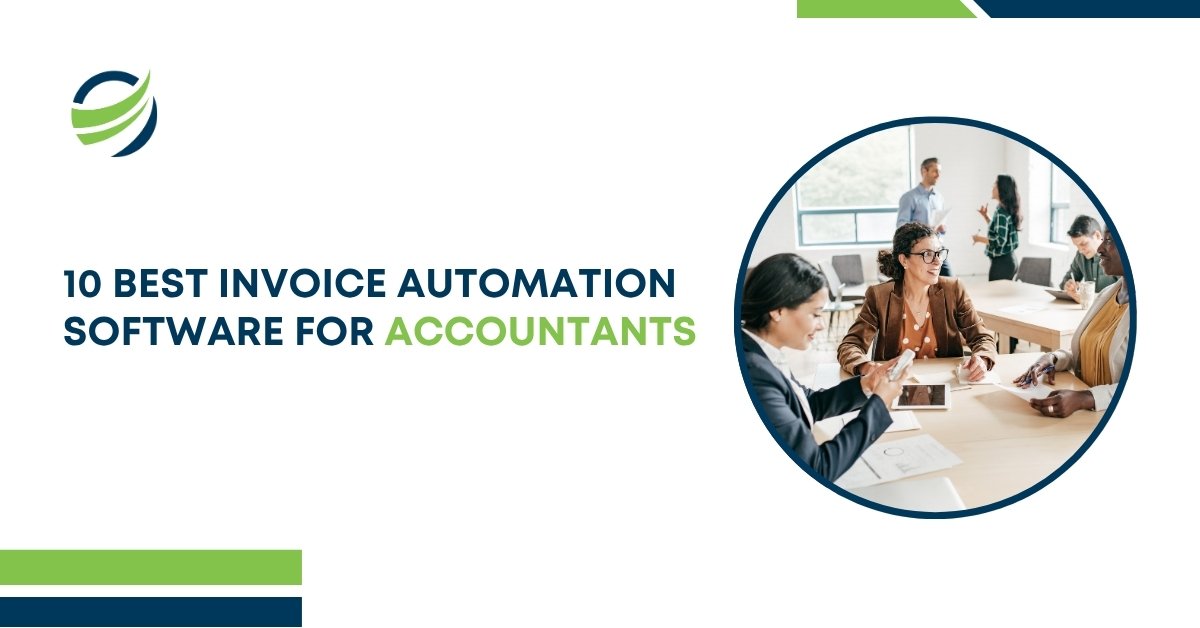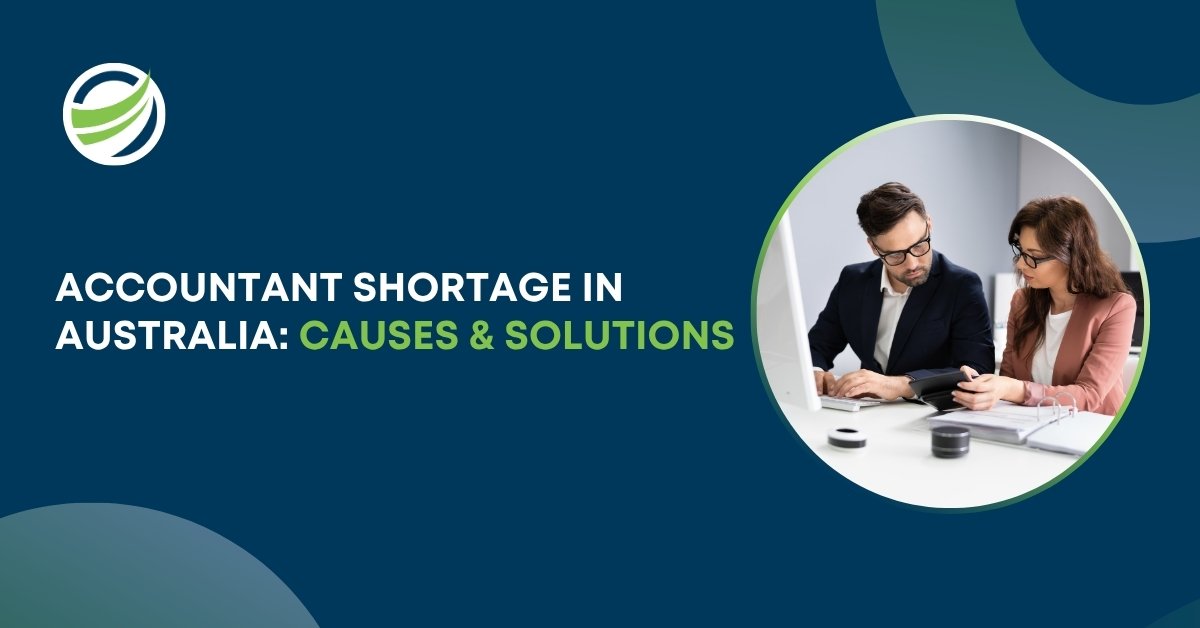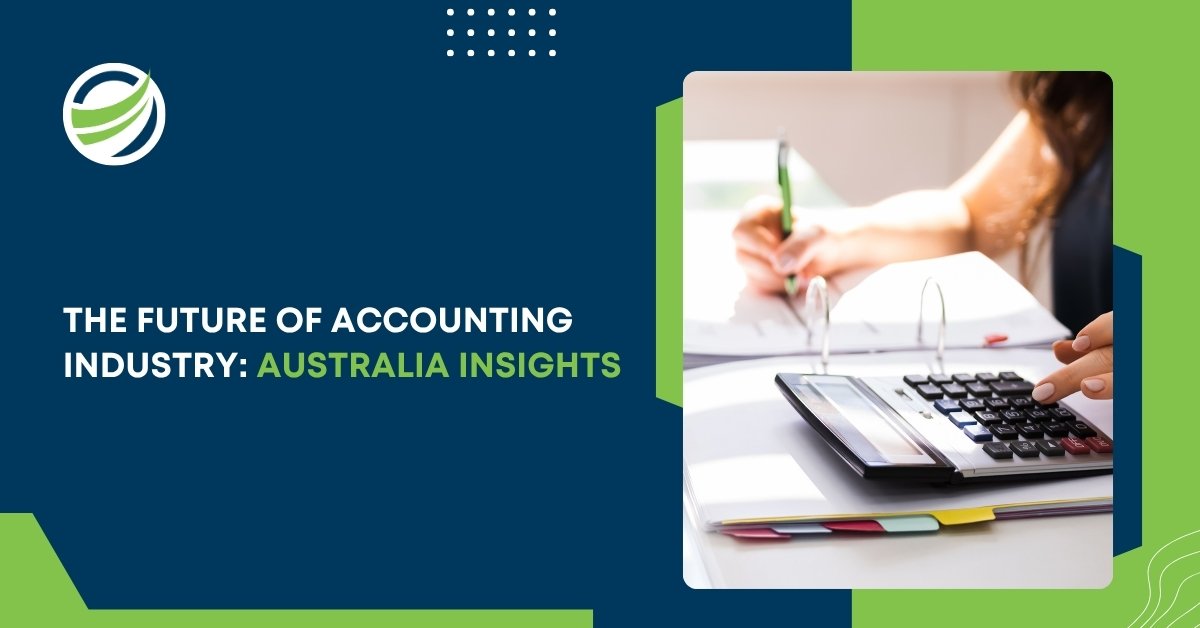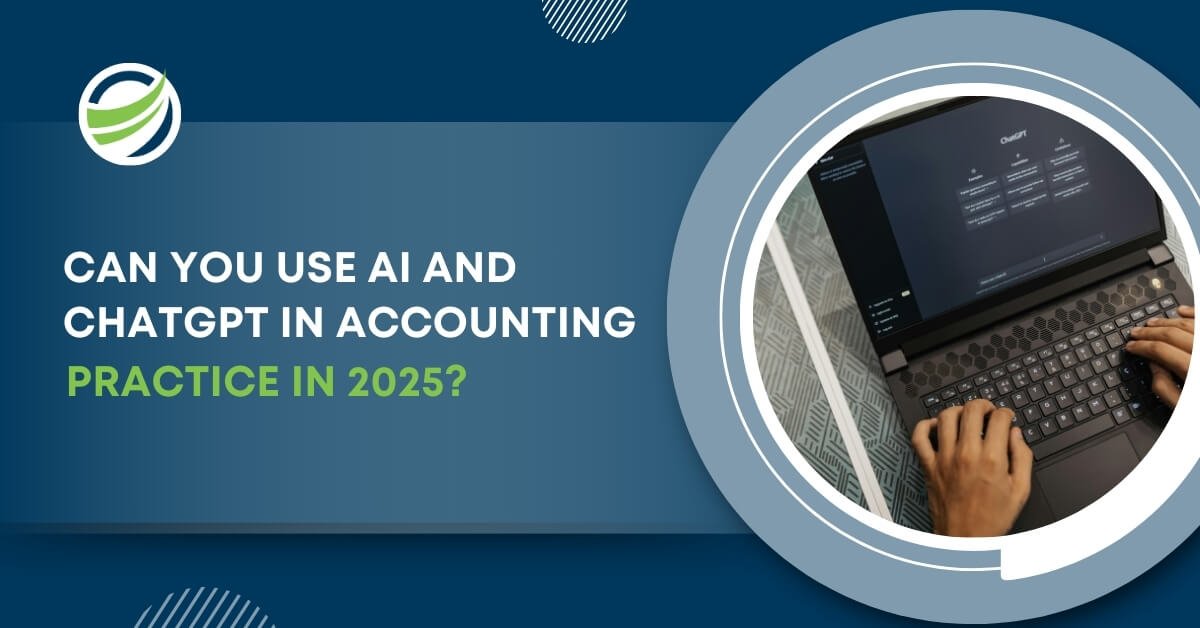2025 Financial Year Date in Australia with Planning Tips
As we approach the 2025 financial year date in Australia, understanding the key dates and planning ahead is crucial for both individuals and businesses. Whether you’re an entrepreneur, freelancer, or someone managing personal finances, knowing the 2025 to 2026 financial year dates can help you stay on top of your financial obligations and take full advantage of tax-saving opportunities.
Let’s dive into the important dates and offer some helpful tips to ensure you’re ready for the upcoming financial year in australia dates.
Key Dates for the 2025 Financial Year
The 2025 financial year date in Australia marks the beginning of an important period for businesses and individuals. Here are the key dates you should be aware of:
- Start Date: The 2025 financial year officially begins on 1 July 2025.
- End Date: It ends on 30 June 2026.
- Tax Filing Deadlines:
- For individuals and businesses lodging their own returns, the due date for filing is 31 October 2026.
- If you’re working with a registered tax agent, you may receive extended deadlines.
Additionally, it’s essential to stay on top of your quarterly BAS (Business Activity Statement) filings, particularly if your business is registered for GST.
Here are the financial quarters in Australia 2025:
- Quarter 1: 1 July 2025 – 30 September 2025 (BAS due 28 October 2025)
- Quarter 2: 1 October 2025 – 31 December 2025 (BAS due 28 February 2026)
- Quarter 3: 1 January 2026 – 31 March 2026 (BAS due 28 April 2026)
- Quarter 4: 1 April 2026 – 30 June 2026 (BAS due 28 July 2026)
These deadlines help ensure that your tax filings are on time and compliant with the tax year Australia dates.
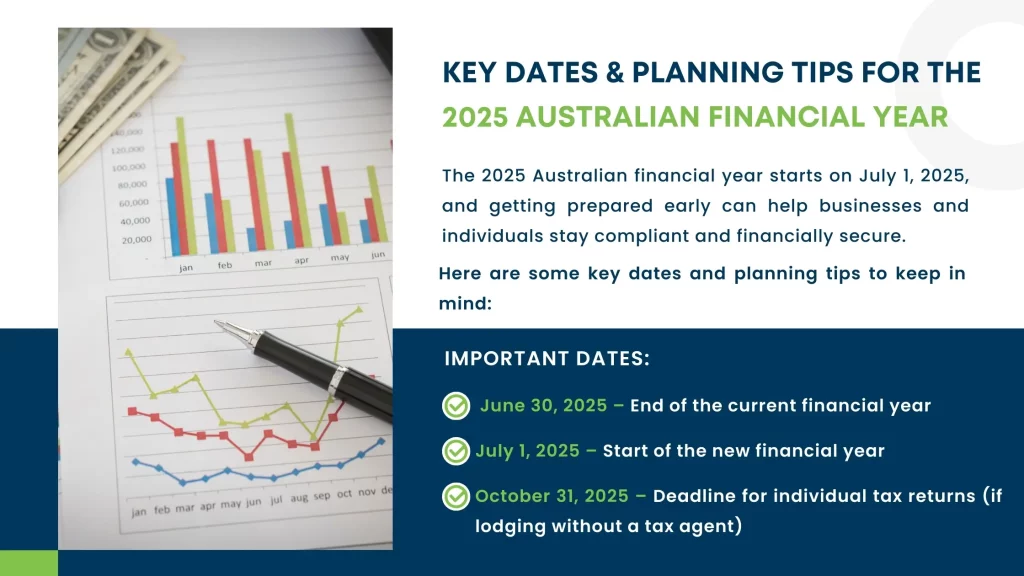
Why Financial Year Planning Is Crucial
Understanding the financial year in Australia dates is important because it provides a framework for tax planning, investment decisions, and cash flow management. If you’re an individual taxpayer or a business owner, careful planning can significantly reduce your tax liabilities and improve your financial outcomes.
By knowing the 2025 to 2026 financial year dates, you can anticipate tax payments, plan for deductions, and avoid costly penalties for missed deadlines. With the right preparation, you can maximise your tax refunds, optimise business deductions, and streamline your financial management for the entire year.
Planning Tips for the 2025 Financial Year
Proper planning is key to managing your finances effectively. Here are some tips for navigating the 2025 financial year and ensuring that you make the most of the opportunities available to you:
1. Keep Track of Your Financial Records
One of the most important tasks is ensuring your financial records are accurate and up to date. For businesses, this means maintaining up-to-date bookkeeping and financial reports.
For individuals, tracking receipts for deductions like work-related expenses and charitable contributions is essential. Stay organised so that filing your tax return at the end of the tax year Australia dates is quick and simple.
2. Maximise Your Deductions
Understanding what you can deduct is vital. For businesses, common deductions include equipment, office supplies, travel expenses, and professional fees. Individuals should also look at opportunities like superannuation contributions, which can reduce taxable income.
The end of the financial year in Australia dates is an excellent time to make additional contributions to your super fund, especially if you want to reduce your tax liability.
3. Plan for GST and PAYG
If you’re a business owner, managing GST (Goods and Services Tax) and PAYG (Pay As You Go) withholding is key. Ensure that you’re paying your quarterly BAS on time and withholding the correct amount from employee wages.
Understanding the financial quarters Australia 2025 will help you stay ahead of these deadlines and keep your business compliant with the ATO (Australian Taxation Office).
4. Review Your Tax Position Early
Don’t wait until the last minute to review your tax position. The 2025 to 2026 financial year dates are a great time to evaluate whether you need to adjust your tax withholding or if you’re eligible for any tax offsets or rebates.
A mid year tax check-up can also help you adjust your strategies and avoid surprises come the end of the tax year Australia dates.
5. Seek Professional Advice
Financial planning isn’t something to tackle alone, especially if you have a complex financial situation. Consider consulting with a tax advisor or accountant who can provide personalised advice on how to maximise your deductions and manage your tax liabilities effectively throughout the financial year in Australia dates.
Key Considerations for Individuals
For individuals, the 2025 financial year is a great opportunity to optimise your tax planning. Here are some key considerations:
- Salary Sacrifice: Contributing to your superannuation via salary sacrifice can lower your taxable income while boosting your retirement savings.
- Tax Offsets and Rebates: Depending on your income and situation, you may be eligible for various tax offsets or rebates, such as the low income tax offset (LITO) or the seniors and pensioners tax offset.
- Investment Strategies: The end of the financial year in Australia dates is the perfect time to review your investments. Consider making tax-efficient investments that may reduce your tax liability.
- Health Insurance: If you don’t have private health insurance, consider getting it before 30 June 2026 to avoid the Medicare Levy Surcharge.
- Personal Deductions: Don’t forget personal deductions like charitable donations, medical expenses, or work-related expenses. Keep track of these throughout the year to maximise your claim.
Key Considerations for Businesses
For businesses, planning around the 2025 to 2026 financial year dates is crucial for managing cash flow and ensuring compliance with tax laws. If you’re running a small or medium-sized business, consider these tips:
- Forecast cash flow: Make sure you have enough liquidity to meet your tax obligations and pay employee wages.
- Take advantage of tax deductions: Many business-related expenses are deductible, including office supplies, travel, and staff costs. Make sure you’re documenting all eligible expenses.
- Reassess your business structure: As your business grows, the right structure can have a significant impact on your tax liability. Consult with a financial advisor to ensure you’re set up for success in the new financial year.
Conclusion
The 2025 financial year date in Australia is approaching fast, and now is the time to start preparing. By understanding the 2025 to 2026 financial year dates and following these planning tips, you can stay ahead of deadlines, maximise your deductions, and make sure your finances are in order.
Whether you’re managing personal finances or running a business, early preparation and regular financial reviews will help you navigate the year with confidence and ease.
FAQ
What date is the end of the financial year 2025?
The Australian financial year for 2024–25 ends on June 30, 2025. This is the deadline for businesses to finalise financial statements, report earnings, and prepare for tax lodgements. Individuals should ensure all deductions and claims are in order before this date to avoid missing out on potential tax benefits.
What date does the new financial year start?
The 2025–26 financial year starts on July 1, 2025. This marks the beginning of a new tax reporting period where businesses and individuals should review financial strategies, set new budgets, and prepare for upcoming tax obligations. It’s also a good time to assess tax-saving opportunities and make necessary financial adjustments.
When are the BAS lodgement dates for 2025?
Business Activity Statements (BAS) must be lodged quarterly. Due dates for 2025 are:
- Q2 (Oct–Dec 2024) – Feb 28, 2025 (with agent extension)
- Q3 (Jan–Mar 2025) – April 28, 2025
- Q4 (Apr–Jun 2025) – July 28, 2025
- Q1 (Jul–Sep 2025) – October 28, 2025
Late lodgements can lead to penalties, so it’s crucial to submit on time.
Are there any changes to Australia’s financial year structure in 2025?
Currently, there are no changes to Australia’s financial year structure in 2025. It will continue to run from July 1 to June 30. However, tax regulations and compliance requirements may evolve, so businesses and individuals should stay informed about any updates from the ATO to ensure compliance and avoid penalties.
What are the key tax deadlines for businesses and individuals in the 2025 financial year?
Important tax deadlines include:
- June 30, 2025 – Financial year-end (finalise records & deductions)
- Oct 31, 2025 – Individual tax return deadline (unless using an agent)
- May 15, 2025 – Companies/trusts using agents must lodge returns
- Various BAS, PAYG, and superannuation deadlines apply throughout the year. Timely lodgement ensures compliance and avoids fines.



